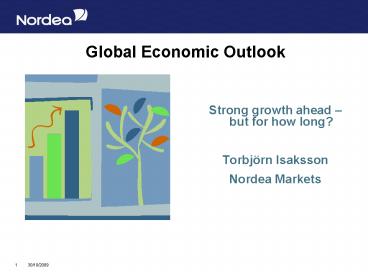Global Economic Outlook
1 / 25
Title: Global Economic Outlook
1
Global Economic Outlook
- Strong growth ahead but for how long?
- Torbjörn Isaksson
- Nordea Markets
2
Global trends
- Strong growth this year in most regions gradual
softening - High oil prices dampens growth, but the effect
abates - Change in economic policy affects 2006
- Inflation stays low
3
USA Continued strong activity short-term
4
USA and the labour market is improving
5
But where will growth stem from long-term?
6
And the Fed is raising rates
7
Effects of oil prices
Effects of a price increase by 10/barrel
Source Federal Reserve
8
Exports the main engine in the euro area
9
Potential for higher domestic demand
- US worries means Europe export worries
- But indicators point to higher investment...
- and companies signal increased hiring
- Rate hikes on the agenda once the recovery
broadens
10
but GDP growth below potential in H1 next year
11
Core inflation too high in the euro area
12
ChinaSoft landing not overheating
Target
13
China
14
China
15
India exports the main engine
GDP
16
Japan more dependent on foreign tradeSlower
growth in China and USA dampens growth in Japan
17
Stronger international growth will rub off
18
Norway consumers are the growth engine
- Low interest rates and solid income growth have
boosted consumption - Increased demand for metals and oil as well as
shipping benefit exports - Low inflation pressure means Norges Bank will
stay on hold until next summer
19
Denmark expansionary policy boosts growth
- Economic policy adds about 1-point to growth
this year - Lower taxes benefit consumption
- Investment is lagging but will catch up as wage
costs are relatively high
-point
EPI (right)
Output gap
20
Sweden looks good in comparisonAbove average
GDP-growth the next few years
21
Higher exports is the main engine this yearSome
sectors are pulling ahead
22
What about telecom going forward?Expect a
slowdown after strong growth contribution this
year
Telecoms contribution to GDP growth
Percentage points
23
Stronger labor market will benefit consumersWill
counteract effect from higher interest rates
24
Low inflation means the Riksbank can waitLow
wage growth, high productivity means price
pressure is low
25
The real economy supports the SEK































